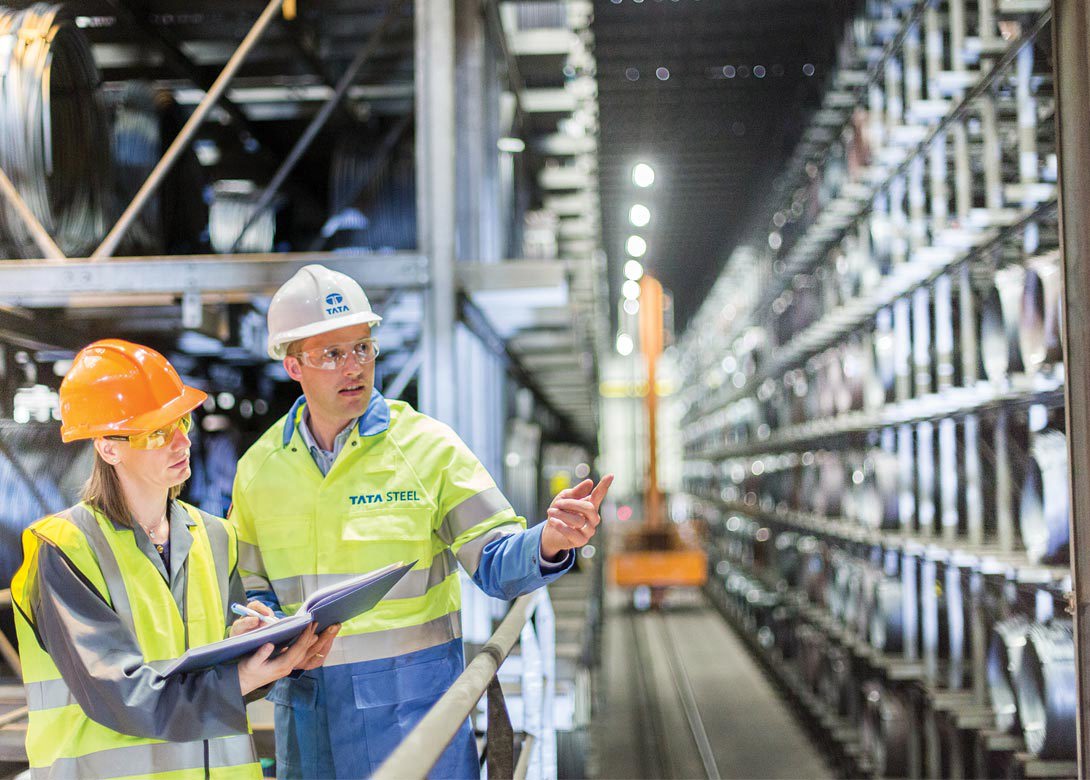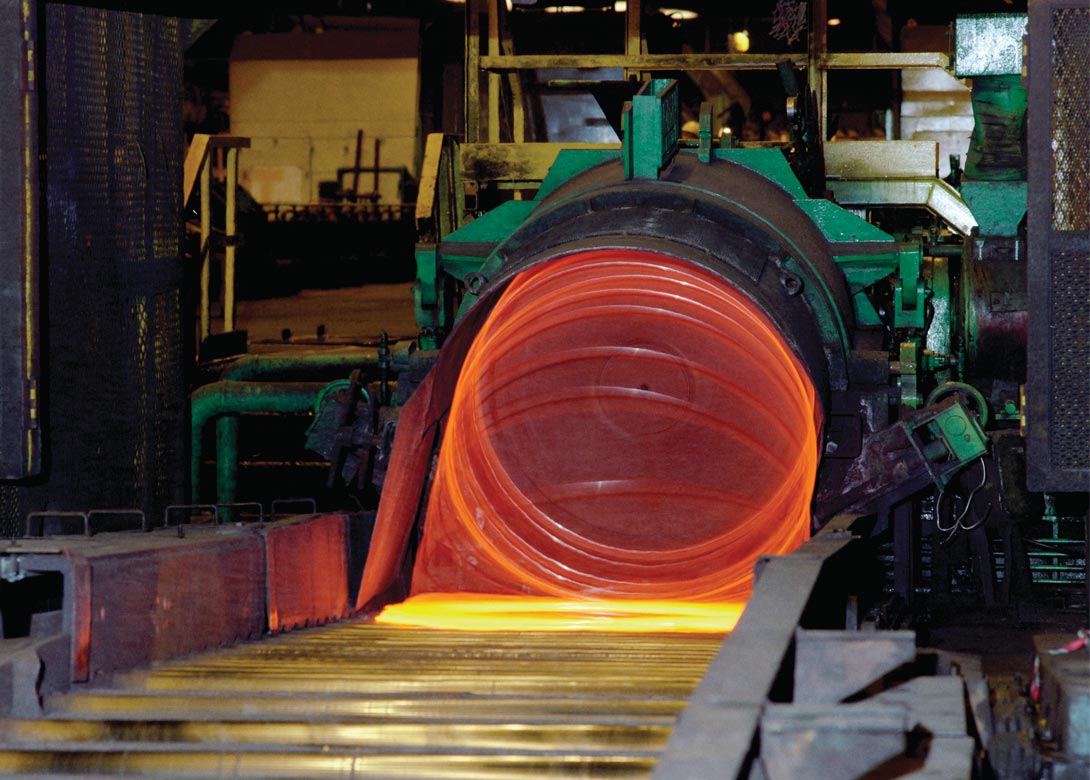
As recent headlines have highlighted, these are tough times for the steel industry. Tata Steel’s Scunthorpe Rod Mill is meeting the challenge head on, growing sales of rod – especially in the fastener sector – through targeted product developments and a real focus on service.
The global steel industry has been struggling with the consequences of overcapacity in China, which has seen steel prices falling to lows not seen since the financial crisis. For Tata Steel, the pressures have been exacerbated by the structural changes in the UK rod market and the decline in the UK manufacturing base. Scunthorpe Rod Mill (SRM) is the majority supplier of drawing quality wire rod to the UK domestic market. On the face of it – an impressive achievement. However, the UK market has contracted dramatically in the last 15 years and is now a fraction of the size it was during the height of the UK steel industry.
Not surprisingly, the Rods business of Tata Steel has been working hard to develop markets for its products across Europe and beyond. It supplies products into many leading wire drawers and converters in mainland Europe and sells its more differentiated products to the Americas and Asian markets. A programme of targeted product development has helped SRM achieve significant gains over the past two years.
Campbell McGibbon, sales director wire rod and semi-finished products at Tata Steel, explains: “Times are tough across the steel industry but our customers also face pressures in their supply chains. At Tata Steel we are working in partnership with both new and long-standing customers to improve everything we do, so we can meet the requirements of the more demanding buyers of differentiated products. That means working collectively to develop partnerships with customers; a strategy that has already seen the wire rod business increase sales into the automotive supply chain from 32% to 45% of overall output over the past three years.”
“We are intent on selling more rod products into demanding supply chains in Europe and in US Dollar markets. In today’s demanding market, where customers have so much choice, we have to differentiate ourselves through service excellence – convincing customers we should be their supplier of choice. It is through the good relationships we have with our customers that we can seek to make our supply chain strong and sustainable. We have chalked up some great successes in recent years, expanding our market in cold heading products and winning business from industry leading customers,” continues Campbell.

A ten year relationship with a southern European cold heading customer has progressively developed through consistent improvements in precision of quality, administration and logistics. Enhanced order visibility, efficient billet supply, consistent rollings and a robust logistics route have all contributed to delivery precision. The establishment of strong technical relationships with the customer through regular liaison meetings, together with the support of an account team dedicated to service excellence, has ensured effective navigation through the supply and quality requirements. Stuart Bullas, technology manager, wire rod, at Scunthorpe Rod Mill, comments: “SRM has worked hard to ensure continuous improvement in quality. Customers need consistent quality with minimal variability. We put a lot of effort into tracking quality concerns down to root cause so we can eliminate them. We are improving continuously and have reduced overall quality complaints by 11% in the last year.”
Much more recently SRM developed a partnership with the largest maker of automotive fastening components in Europe. Wire rod coil weight was critical in optimising the customer’s cleaning and annealing processes. To meet these requirements Rods developed new process routes on bloom splitting and rod rolling to tailor the final coil weight.
It is now also building on an existing relationship, supplying a leading producer of automotive and critical performance fastening technology, to strengthen its market position in Germany. This entailed a new control programme to further tighten dimensional tolerances, involving the examination of size, shift and strand effects. Master classes with the SRM shift rolling teams facilitated best practice and resulted in the adoption of asymmetric tolerance specifications for trial rollings. Feedback on trial material delivered to the German company was very positive and the Rods team is now continuing to develop their partnership with this customer to ensure a high-level of customer satisfaction. Future developments with the customer include a programme of work again aimed at delivering smaller, specific weight coils to match the customer’s process.
The Wire Rod sales and marketing team has also focused on the development of cold heading product sales into the US. One of the major challenges faced by the team was to meet the different specifications required by the US fastener industry. One Detroit customer had historically sourced steel from a range of domestic electric arc furnace based steel suppliers but was keen to try steel from an offshore supplier, particularly Tata Steel as a basic oxygen steelmaker. In 2014 the customer started with a conservative initial trial of minimum quantities of two Grades. The coils were supplied in containers and, as they were surface critical, were sleeved with a polyweave fabric to protect from damage. Pleased with trial results, the customer placed further orders and requested 3 further grades.
Tata Steel is following on this success by building relationships with other customers in the region. Crucial to this has been the ability to offer the silicon-killed steel Grades required by the US market. A logistics service supported by a US-based team also arranges deliveries from the ports to multiple processors.
Alongside specific customer developments, SRM is rising to the challenge of more demanding customers and supply chains. “We can’t afford to stand still. We’re constantly striving to improve the capability on our existing mill to meet the technical demands of our customers and to support them to compete in their markets. For example, the cold heading market requires tight tolerances on size and shape. We have recently expanded our size range and are now looking at future developments in line with customer requirements. We’re also developing tighter dimensional tolerances across the size range. Our customers play a vital role in our business and we will continue to listen to their requirements and strive to continuously improve,” explains Campbell.
For Campbell, there is no room for complacency: “We know we must deliver consistently on quality and service, or face losing hard-won business. We have an outstanding team of really committed people in Scunthorpe, and in our sales offices around the world, who are intent on seeing not just the survival but the growth and success of this business for years to come.”

Biog
Will joined Fastener + Fixing Magazine in 2007 and over the last 15 years has experienced every facet of the fastener sector - interviewing key figures within the industry and visiting leading companies and exhibitions around the globe.
Will manages the content strategy across all platforms and is the guardian for the high editorial standards that the Magazine is renowned.








